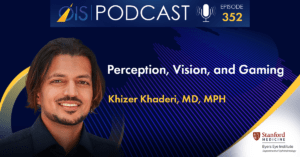On Perception, Vision, and Gaming, with Khizer Khaderi, MD, MPH

Click here to watch the video version of this podcast.
With extensive experience as both a medical and technology professional, Khizer Khaderi, MD, MPH, could be described as either a technology whiz who practices medicine or an ophthalmologist pursuing technology. In reality, he falls into a field all his own, combining what he knows about sports performance, vision, and advanced technology into a career that currently includes teaching, research, and leading an AI start-up (Vizzario).
Dr. Khaderi is the clinical associate professor at the Byers Eye Institute at Stanford University, founder and director of the Stanford Human Perception Laboratory and the Stanford Vision Performance Center, and faculty at the Stanford Institute for Human-Centered AI.
In this week’s podcast, he speaks with host Sophia Pathai, MD, PhD about the potential for augmented reality, virtual reality, the metaverse, and Web3 in clinical care.
But before all that, he talks about a career that started in his teens—he started medical school at 19 after earning his master’s in public health. During his residency in ophthalmology at the University of Arizona, his research focused on vision performance in athletes.
Working with the school’s basketball team, which included soon-to-be-NBA-pro Dell Curry, he focused his research on how athletes perceive and what happens to their retinal ganglion cells as they do. His findings led him to launch a video game start-up centered on sports performance. When that didn’t take off, his path returned to ophthalmology.
Listen to the podcast today to hear Drs. Pathai and Khaderi discuss:
• How Dr. Khaderi started the Stanford Human Perception Laboratory and what he’s learning about virtual reality and visual perception.
• The Vision Performance Index, a tool used to analyze vision-related data.
• Exciting biomedical device developments on the horizon for 2023.
• How Dr. Khaderi sees technology and medicine evolving – together – over the next few years.
• His views on what the intersection of technology and medicine means for today’s residents and medical students.
• What lies ahead for Web3 and the metaverse in clinical settings. How will they have an impact?
Click “play” to listen.
